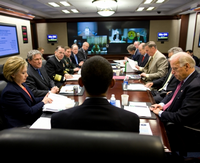The system we have in place today to ensure the nation's security from terrorism can be overwhelmingly complex, reflecting a broad diversity of major players and dozens of strategic objectives. This complexity is due, in part, to successive administrations redefining an increasingly intricate web of relationships, roles, and responsibilities, often without rescinding -- or fully integrating with -- direction established by their predecessors. As a result, the nation's counterterrorism system has evolved largely in a piecemeal, ad hoc fashion, without the benefit of an overarching strategy or blueprint for how best to organize for success.
Over five years ago, the 9/11 Commission recommended the establishment of a National Counterterrorism Center -- an interagency entity responsible for "joint operational planning and joint intelligence," designed to "break the mold of national government organization." In a 2004 statement to the Senate Committee on Governmental Affairs, Philip Zelikow, executive director of the 9/11 Commission, asserted that "since terrorism poses such a revolutionary challenge to old ways of executive management in our national security bureaucracy, counterterrorism requires an innovative response."
Soon after the commission released its report, the Intelligence Reform and Terrorism Prevention Act of 2004 established the nation's first dedicated interagency counterterrorism planning cell, mandating it to "[integrate] all instruments of national power" in order to "conduct strategic operational planning for counterterrorism." The creation of NCTC and its Directorate of Strategic Operational Planning (DSOP) represented a significant step in the U.S. government's approach to confronting complex and cross-cutting national missions such as counterterrorism. But much work remains before this vision can be fully achieved.

